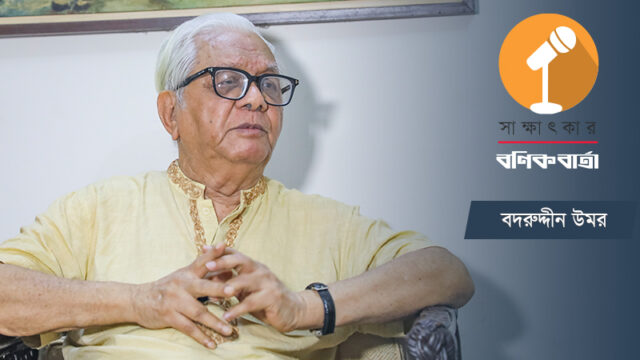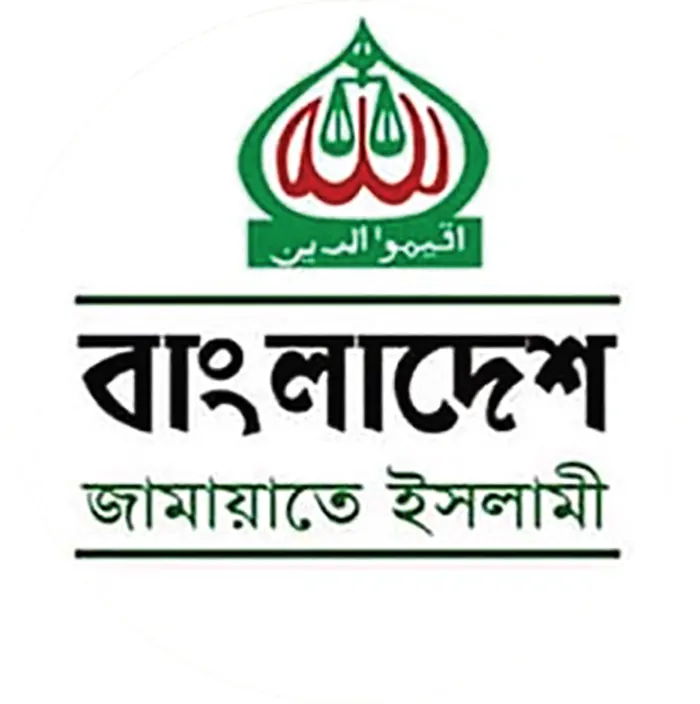Veteran political thinker, theorist, and politician Badruddin Umar, who carries a political legacy from his family, has been involved in politics and research for 53 years. With over a hundred books on various subjects such as politics, sociology, and culture in the country, Umar spoke to Banik Barta about the current student movement and its future implications. The interview was conducted by Anika Mahjabin.
Q: We would like to hear your assessment of the current student movement and the overall situation.
Badruddin Umar: Development cannot hide malpractices. Ultimately, the issue of oppression against people has come to the forefront. To understand the current movement, one must understand the past popular uprisings. There have been a total of five uprisings in this region. The first uprising was the Language Movement in 1952.
Currently, we are witnessing a large-scale popular uprising against Sheikh Hasina in Bangladesh. To comprehend the true nature, causes, and potential outcomes of this uprising, we must look back at the historical popular uprisings in this region. Without this context, understanding the current uprising is not possible. It should be noted that Bangladesh is the only place in the undivided Indian subcontinent where such events of popular uprisings have occurred. We saw the first popular uprising in this region in 1952. The second uprising was in 1969, and the third was in January 1971. In 1990, we saw the fourth popular uprising against Ershad.
Each of these uprisings resulted in a change of government. Although the government did not change directly in 1952, political parties were formed in the early days of Pakistan due to the consequences of the 1952 movement. It can be seen that following the 1952 movement, the Muslim League government fell in the 1954 elections. Not only did the government fall, but the Muslim League was also uprooted from East Bengal. In the 1969 uprising, although the military government remained, Ayub Khan’s government was replaced by Yahya Khan’s government. By January 1971 or earlier, a large-scale popular movement had begun, creating such a situation that the government could no longer conduct its normal activities. Consequently, the military had to directly govern the state. After March 25, the war began, which resulted in the destruction of the Pakistani state. The uprising and the people’s movement were so powerful back then. Subsequently, a large movement began against Ershad in independent Bangladesh. Although this movement was not nationwide, I wrote at the time that it was a ‘citizen’s uprising.’ The movement against Ershad was centered in Dhaka and other cities, not in rural areas. This citizen bourgeoisie uprising resulted in the fall of Ershad’s government. It is seen that after the previous four uprisings, there was a change of government. The 1971 popular uprising culminated in the Liberation War, resulting in the destruction of the Pakistani state.
The current popular uprising has created such a situation that it will be difficult for this government to survive. No previous uprising has been as extensive as this one. The movement has spread not only in Dhaka and other cities but also throughout the entire rural area. By not engaging in dialogue with the students during the quota movement, the government’s attack on students caused the movement to spread among the people. People have joined this movement from their respective positions. It is essential to note that the students’ movement is no longer just seen as a quota movement. There has been long-standing resentment among general students against the atrocities, violence, and various oppressions carried out by the student wing of the ruling party in government universities. This resentment also fueled the students’ quota movement. This cannot be seen solely as a quota or employment movement. The situation in the universities triggered the quota movement’s reaction. Due to the government’s attack, the quota movement spread among the people, creating a situation akin to an uprising, which has now become widespread across the country.
It is not just the oppression of students that has led the people to join this uprising. The lives of people across the country have become disrupted; the prices of essential goods have skyrocketed. The prices of oil, gas, and electricity have risen uncontrollably. The government has interfered with people’s freedom of expression and speech. Nothing can be said against the government, especially the head of the government, in the newspapers. An unbearable situation has arisen, and people have no confidence in the government. They believe that as long as this government remains, the rampant price increases, money laundering, and theft from government projects will not stop. Thus, the uprising has now occurred.
The government claims to have brought this uprising under control. But it appears that the government has not been able to control the situation even after all this time. They are still imposing curfews. Internet access is being restricted and controlled to limit the flow of information. This shows that they have not yet been able to fully control the situation. However, it is surprising that the leaders and activists of the quota movement are being newly arrested and tortured. The outcome of this will be interesting to see—whether a new wave of movement will start. Protests against government oppression are happening everywhere, not just in the country but worldwide. Students on university campuses, intellectuals, writers, and even diplomats from 14 countries in Dhaka have demanded an investigation into the killings and the trial of those responsible. So far, it has been confirmed that over two hundred people have died from various sources. But there is no actual count of how many people have died. It might be that only hospital data is being used for the count. Those who were killed outside hospitals were not brought to hospitals. Thus, there is no real count of how many people have died. This indiscriminate killing has united the people against it. One cannot say that the situation has returned to normal. Given the current state, there is a full possibility of a new wave of movement; another push may come soon. What will happen to the government in that push remains to be seen.
Q: You witnessed the 1969 popular uprising. How would you compare this movement to the current one?
Badruddin Umar: There are similarities between the 1969 movement and the current one. Ayub Khan ruled Pakistan for ten years. After ten years, there was a great celebration around the ‘Decade of Development.’ The entire country’s people united against Ayub Khan, expressing their anger and demanding a change of government. Despite talks of development, it was impossible to cover up the people’s accumulated grievances against the exploitation and oppression during Ayub Khan’s rule. On the contrary, despite development, the people’s resistance against exploitation and oppression reached a point. People didn’t think about development but rather about how much they had been oppressed. Because Ayub Khan’s development did not benefit the people, only the ruling class benefited from it. The current government is also boasting about development. It can be seen that the condition of major projects is worse than during Ayub Khan’s time. Large-scale projects mean large-scale theft now. Billions of takas have been spent on these projects. From these projects, the people of Awami League, government officials, and beneficiaries have looted thousands of crores. By looting in this way, they have created a situation where the fruits of development have not reached the people. The prices of goods have risen while people’s incomes and wages have not increased accordingly. Consequently, their real income has decreased. People who used to eat three meals a day are now barely surviving on two or one meal a day. They cannot eat fish and meat as they used to. Even the amount of food has decreased.
One after another, reports of corruption worth billions by government officials have impacted the people. How much benefit have ordinary people received from large infrastructure projects? Due to insufficient investment in education and health, the people of the country are falling behind. Ayub Khan could not escape by talking about development, and the current government will likely not escape either.
Q: The government blames BNP-Jamaat for the current situation. How do you view this?
Badruddin Umar: Awami League is now in a dilemma about whom to blame. In this case, they see nothing but BNP-Jamaat. They do not see the people of Bangladesh. They cannot fathom that the people can stand up against their misdeeds. They have no capacity to think this way. Therefore, they are blaming BNP-Jamaat. It is true that BNP-Jamaat has participated to some extent in this movement. There is nothing wrong with that. If such an uprising occurs, should Jamaat or BNP, as political parties, remain idle? We believe that these two parties have not participated as much as they should have. Due to their bankruptcy, BNP and Jamaat did not come forward significantly. They should have, but they do not have the capacity. Now that Awami League is blaming them, it is not benefiting Awami League. Instead, it is benefiting BNP-Jamaat. They are glorifying BNP-Jamaat by blaming them for something they didn’t do. This is extreme stupidity and bankruptcy on Awami League’s part. Obaidul Quader’s call for Awami League leaders to take to the streets was nothing but crying in the wilderness. Local Awami League leaders did not respond to his call. No one took to the streets. He himself stated this in a statement. Participation was so low that some ward committees in Dhaka were dismissed. This shows that Awami League people themselves did not stand for the party. Only the police, RAB, BGB, and the army support the government.
Q: What could be the reason for Awami League activists not taking to the streets?
Badruddin Umar: They did not come forward because, while the top leaders might not understand the situation










